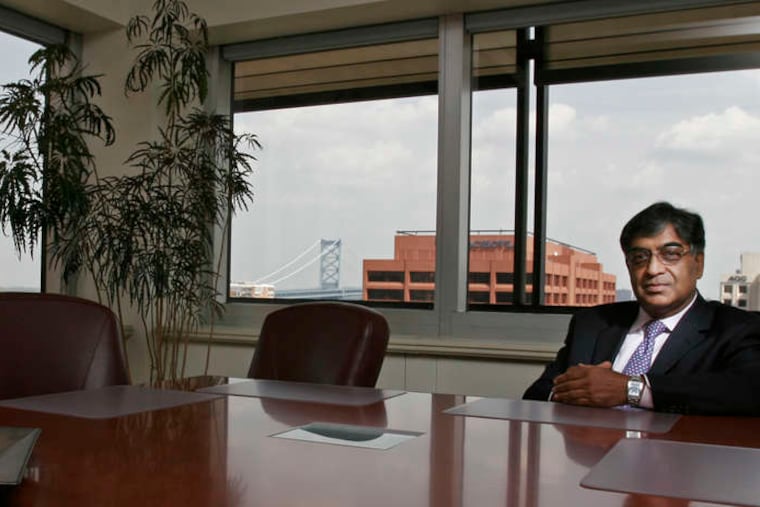Avantor shares jump as activist investor presses new CEO for cuts
The Radnor-based chemical and lab equipment maker’s stock had fallen to an all-time low.

Long-depressed shares of Avantor Inc., the Radnor-based chemical and lab-gear maker that employs 14,000 at plants around the world, jumped nearly 10% early Monday after activist investor Engine Capital Management pushed directors to streamline or sell the company, which had been trading at its lowest value since it went public in 2019.
The stock settled around $12.10, up 5% for the day, after Avantor directors wrote back that they believe they are already on track to deliver better results and showed no signs of caving in to demands by Engine, which is headed by veteran investors Brad Favreau and Arnaud Ajdler.
In their letter, the activists told Avantor directors, who are led by chairman Bruce Peacock, former CEO of Amgen, that a more active board could double the share price over the next 2½ years by cutting costs, selling businesses, and propping up the share price by using Avantor cash to buy more of the company’s stock.
Favreau and Ajdler also noted in their letter that Engine owns about 3% of Avantor, enough to rally other disgruntled investors. They said Avantor’s bioprocessing unit and the company’s unusually large global distribution network gave it long-term advantages.
Avantor was cobbled together by investors including Rohm & Haas’ last CEO, Rajiv Gupta, from businesses including New Jersey-based Mallinckrodt Baker chemicals, parts of Tyco International healthcare spinoff Covidien, and West Chester-based lab-equipment giant VWR Corp., with backing from the New Mountain private-equity group, which extracted billions from Avantor before its 2019 initial public stock offering (IPO) that left Avantor deeply in debt.
Though the debt has been partly paid down, the activists complained Avantor is now “deeply undervalued” by investors, due to falling profitability and declining market share at its lab equipment business.
In the letter, they noted Avantor has lost nearly half its stock-market value over the past five years, while its peers among “Life Science Tools & Services” companies have as a group recorded little net change in value for that period, and the healthcare stocks in the S&P 500 are up a collective 22%.
Peacock’s board “is responsible for Avatar’s underperformance” and “failed to adequately oversee” Avantor operations, they added.
They noted that Ingersoll-Rand in 2023 offered to pay up to $28 a share for Avantor. That price, which the board rejected, is more than double the company’s current value.
Avantor’s main rivals among lab-equipment distributors, Thermo Fisher Scientific Inc. and Germany-based Merck KGaA, have made successful acquisitions and boosted market share at Avantor’s expense, leaving Avantor as the smallest of the three.
They added that former Avantor chief executive Michael Stubblefield denied losing market share until competitors’ data made it impossible to ignore. The board announced Stubblefield’s departure in April.
Also according to the letter, Avantor’s key profit margins, which in the two years after it went public were higher than Thermo’s, are now about 30% lower, which Engine blames on poor cost controls and lagging productivity.
The Engine letter blamed expensive acquisitions in 2020-21 for ballooning Avantor’s debt without delivering higher profits and tied executive turnover to an “inefficient” distribution of company leaders between Radnor, Boston, the Lehigh Valley, Washington, and New York, along with excessive bonuses despite mediocre financial results.
To recover, the letter said, Avantor needs to quickly review products, services, pricing, and “bloated” businesses that ought to be simplified or cut. Engine also said the board has been too generous with executive bonuses, given Avantor’s financial results.
They also prescribed deeper cost cuts under designated new chief executive Emmanuel Ligner and CFO Brent Jones and the possible sale of Avantor assets, as “the life sciences industry is consolidating.”
The letter concludes by urging the board to replace chairman Peacock and to add directors who are former CEOs of big successful companies, distribution executives, and have experience getting big returns for expensive investments. And they asked to meet with the board.
In their shorter response, Avantor directors defended their record. They called Avantor “uniquely positioned for success” with its current businesses, noted they have hired new managers and put together a cost-cutting program, and are buying down debt, with guidance from Goldman Sachs & Co. and other advisers. Ligner takes over as CEO on Aug. 18.
Past Philly targets
Earlier this year, Engine threatened a rare contested board election at ailing Lyft, the second-largest rideshare company, but withdrew its insurgent candidates after Lyft agreed to buy back more shares. Engine failed to stop formerly Philadelphia-based Sunoco’s $9 billion purchase of Canadian oil Parkland Corp., which Engine, a Parkland shareholder, said wasn’t enough money.
The activists’ previous targets and reorganizations have included Philadelphia-based construction management firm Hill International, the Philadelphia-based Charming Shoppes and Destination Maternity retail chains, among dozens of other companies.